
Carl Esmond was an Austrian-born American film and stage actor, born in Vienna, Austria-Hungary. Although his age was given as 33 in the passenger list when he arrived in the USA in January 1938, in his naturalization petition his birth year is stated as 1902. His stage names were Willy Eichberger and Charles Esmond and finally Carl Esmond. He trained at Vienna's State Academy of Dramatic Arts, and made his film debut in the operetta The Emperor's Waltz (1933). He was active in the Viennese genre of shallow romantic comedies so popular in the Austria of the interwar period.
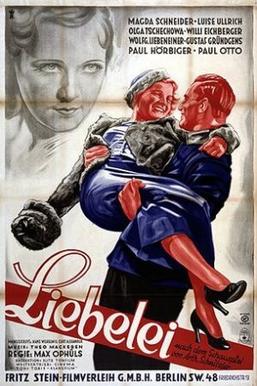
Liebelei is a 1933 German period drama film directed by Max Ophüls and starring Magda Schneider, Wolfgang Liebeneiner, and Luise Ullrich.

A Summer You Will Never Forget is a 1959 West German drama film directed by Werner Jacobs and starring Claus Biederstaedt, Antje Geerk and Karin Dor. It was based on a novel by Marion Jahn.
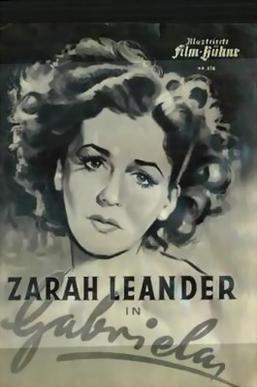
Gabriela is a 1950 West German musical drama film directed by Géza von Cziffra and starring Zarah Leander, Carl Raddatz, and Vera Molnar. It was Leander's comeback film after a seven-year absence from filmmaking. In 1943 when the Nazi leadership had demanded she take German citizenship, she had broken her contract with UFA and returned to her native Sweden. In the immediate post-war era she was banned from appearing in German films because of her previous association with the Nazi hierarchy. When the law was lifted in 1949, she was able to make films once more.
5 June is a 1942 German war film directed by Fritz Kirchhoff and starring Carl Raddatz, Joachim Brennecke and Karl Ludwig Diehl. The film depicts the events of 1940 when German forces successfully invaded France. It was shot on location in France and Germany. Constant changes to the film, often at the request of the German military, led to large cost overruns. In November 1942, the film was banned by the Minister of Public Enlightenment and Propaganda Joseph Goebbels for unspecified reasons. It has been speculated that Goebbels thought the film was not entertaining enough or wished to avoid offending the Vichy government of France.
Carl Raddatz was a German stage and film actor. Raddatz was a leading man of German cinema during the Nazi era appearing in a number of propaganda films and romances. Later in his career he developed a reputation for playing benevolent father figures.

Mother and Child is a 1934 German drama film directed by Hans Steinhoff and starring Henny Porten, Peter Voß, and Elisabeth Wendt. It is a sound remake of the 1924 silent film Mother and Child which had been a major hit for Porten. Franz Schroedter worked as art director on the film.
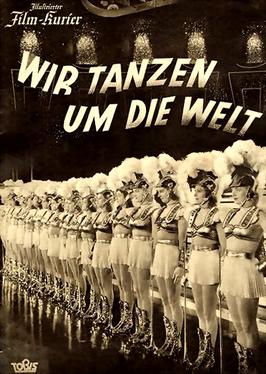
We Danced Around the World is a 1939 German musical film directed by Karl Anton and starring Charlotte Thiele, Irene von Meyendorff, and Carola Höhn. It is a backstage musical. The film's sets were designed by Paul Markwitz and Fritz Maurischat.
Rosemary's Daughter is a 1976 West German sex comedy film directed by Rolf Thiele and starring Lillian Müller, Béla Ernyey, and Werner Pochath. It is based on the story of Rosemarie Nitribitt, which Thiele had already treated more seriously in the 1958 drama Rosemary.

Third from the Right is a 1950 West German musical crime film directed by Géza von Cziffra and starring Vera Molnar, Robert Lindner and Peter van Eyck. It was made by the Hamburg-based company Real Film at the Wandsbek Studios in the city. The film's sets were designed by the art director Herbert Kirchhoff.

The Emperor's Waltz is a 1933 German musical film directed by Frederic Zelnik and starring Mártha Eggerth, Paul Hörbiger, and Carl Esmond. It was shot at the Tempelhof Studios in Berlin with sets designed by the art director Franz Schroedter. Location shooting took place around the Austrian spa town Bad Ischl.

Shadows of the Past is a 1936 Austrian drama film directed by Werner Hochbaum and starring Luise Ullrich, Gustav Diessl and Lucie Höflich.

Beloved Life is a 1953 West German drama film directed by Rolf Thiele and starring Ruth Leuwerik, Carl Raddatz and Albert Lieven. Following her husband's release from a prisoner of war camp in 1947, a woman remembers their lives together since the pre-First World War era.

The Last Waltz is a 1953 West German musical romance film directed by Arthur Maria Rabenalt, and starring Eva Bartok, Curd Jürgens, and O. E. Hasse. It is an operetta film, based on the 1920 work The Last Waltz by Oscar Straus. It was one of several film adaptations of the operetta. It was shot partly at the Wiesbaden Studios in Hesse and on location in the Rhineland. The film's sets were designed by the art director Max Mellin.

The Great Test is a 1954 West German drama film directed by Rudolf Jugert and starring Luise Ullrich, Hans Söhnker and Karin Dor. It was shot at the Spandau Studios in West Berlin and on location around the city. The film's sets were designed by the art director Gabriel Pellon.
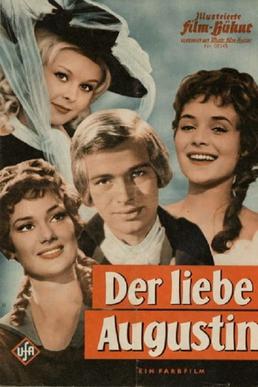
Beloved Augustin is a 1960 West German historical comedy film directed by Rolf Thiele and starring Matthias Fuchs, Ina Duscha, and Veronika Bayer. It is not a remake of the 1940 film of the same title.

Victoria is a 1935 German drama film directed by Carl Hoffmann and starring Luise Ullrich, Mathias Wieman and Alfred Abel. It is an adaptation of Knut Hamsun's Victoria. It was made at the Johannisthal Studios of Tobis Film in Berlin. The film's sets were designed by the art director Kurt Herlth and Werner Schlichting. It was shot on location in Bergen in Norway.
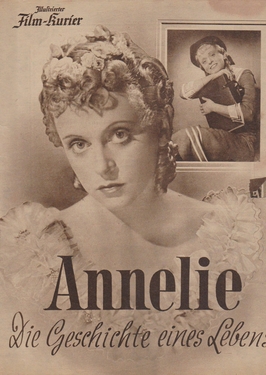
Annelie is a 1941 German historical comedy drama film directed by Josef von Báky and starring Luise Ullrich, Werner Krauss and Käthe Haack. It was shot at the Babelsberg and Tempelhof Studios in Berlin and on location around Königsberg in East Prussia. The film's sets were designed by the art director Emil Hasler. It was based on a play of the same title by Walter Lieck. It was screened at the 1941 Venice Film Festival.















